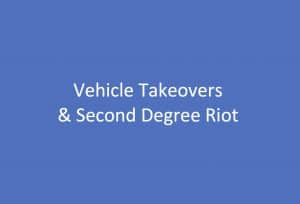Prosecutors Using Second Degree Riot as a Vehicle to Charge Car Takeover Events
Recently, takeover events have made headlines around the twin cities. Vehicle “takeovers” are when a group of people occupy an intersection or parking lot and start doing donuts, thus taking over the area. Often it is for show and a form of entertainment. People take videos, stream live on social media, and create buzz about the exhibition. What’s the matter with a little fun and showmanship? The issue is when it disturbs public peace and property, and sometimes results in spectators getting hurt. The result is law enforcement and prosecutors get involved. There is no specific law addressing such an event, like “you just violated the takeover law.” Disorderly conduct is too weak for the public eye of the tough-on-crime crowd. As prosecutors thumbed through their rolodex of statutes, they landed on second degree riot and figured this will do.
Minnesota law defines second degree riot as “when three or more persons assembled disturb the public peace by an intentional act or threat of unlawful force or violence to person or property, each participant who is armed with a dangerous weapon or knows that any other participant is armed with a dangerous weapon is guilty of riot second degree…”. Fitting that definition into takeover events appeared to be a stretch, which led to legal challenges and a published (precedential) court of appeals opinion.
Recently, the Minnesota Court of Appeals addressed a probable cause challenge to second degree riot in State v. Abdus-Salam. In that case, the defense won its probable cause motions in the district court on the basis that the vehicles were not dangerous weapons because they were used in a controlled manner. On appeal, the court reversed; and reasoned that the prosecution submitted facts showing “defendant knew that the cars would be driven with passengers hanging from them and in a reckless manner dangerously close to onlookers during an illegal intersection ‘take-over.’” The court of appeals also determined that vehicles used in that manner qualify as a “dangerous weapon” for the purpose of being “armed with a dangerous weapon” under the second-degree riot statute.
Importantly, the court of appeals addressed a probable cause challenge. Often it does not take much for a court to find probable cause; and even if they do, the defendant still has a right to trial with the proof beyond a reasonable standard. For probable cause, the court of appeals relied on this standard: “A district court should deny a motion to dismiss for lack of probable cause ‘if the facts before [it] present a fact question for the jury’s determination on each element of the crime charged.’” The court of appeals ultimately determined that a fact question exists for a jury’s determination, including whether the defendant knew that the cars would be used in a manner known to be capable of producing death or great bodily harm.
The court of appeals also determined that being “armed with a dangerous weapon” includes someone driving a vehicle. The defense argued that “armed” is vague and is at best something that a person can hold. Minnesota enacted the rioting statutes in the early 1960s in response to actual riots, not in response to people doing donuts. In those riots, people would wield various objects in their hands and throw them, swing them, or use them as a weapon. Not takeover events in vehicles. Regardless, the court of appeals stretched the definition of “armed” by diving into the history of words and acts from the thirteenth century. The defense is asking the Minnesota Supreme Court to grant view of this matter. If they do, it will be interesting to see how they decide the issue.
Robert H. Ambrose is a criminal defense lawyer and DUI lawyer in the Twin Cities. Minnesota. Super Lawyers named him a Super Lawyer for the past two years and a Rising Star in the preceding six years. He is an adjunct professor at the University of Minnesota Law School. DWI Lawyer Minneapolis MN; Criminal Defense Attorney St. Paul MN; and Criminal Appeals Attorney Minnesota.

